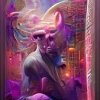Right, good tip I should try lower dose and perhaps not taking it every day. To me the dreams/nightmares are so bizarre and almost torturing, like some world-end scenarios, that I can't sleep restfully. But yeah maybe with lower dose and less frequent dosing I can avoid them and still get the benefits of Ginkgo. Definitely don't want to give up on it, Ginkgo is one of the more effective herbals. Haven't gotten headaches or other side effects, at least not yet.

Ginkgo Biloba - The Neutral Nootropic
#91
Posted 15 August 2023 - 05:19 AM
#92
Posted 15 August 2023 - 06:02 PM
Maybe I did have more nightmares than I'm remembering? I tend to forget my dreams quickly. I woke up a couple times very early, although could also be stress. Ginkgo is supposed to lower stress, but sometimes the extra DA and NE can interfere with sleep. GABA antagonist properties could also be at play, with the larger dose. 5-HT3 may also affect REM sleep characteristics. Plants are nice, but they can have unintended cascading side effects just like potent meds, and it's worth titrating up to the minimally effective dose. If you jump suddenly in the deep end, it can be difficult to understand all of what's going on.
I guess everyone is going to experience different side effects. Not a problem. Side effects just mean you are alive.
Saffron is another antidepressant herb, with both mild stimulant and sedative properties—mild adaptogenic effects and fewer side effects IMO than ginkgo or St John's. It's more mild than caffeine even. I know you mentioned you weren't planning to try saffron immediately. But I'd recommend doing some more of your own research between now and then. Like NAC, saffron "seems" to be a wonder drug for everything psychiatric... from depression and anxiety to ADHD and OCD. Reports that it boosts dopamine, potentially serotonin and glutamate as well. Seems to be a good general supplement for mental health, which builds in effect cumulatively over time, but some of the claims are no doubt sensationalized or suffering from research bias (e.g. Iran producing most of the world's saffron, and also publishing much of the positive research).
Saffron is being explored as an adjunctive therapy for drug addiction and addiction management. We here review the role of saffron in the psychiatric disorders, such as mental disorders (depression, anxiety, sleep, and sexual), cognitive functions, schizophrenia, addiction, obsessive-compulsive disorder, attention-deficit/hyperactivity disorder, and Eating disorder. Adequate administrate of saffron seems to be crucial in terms of psychiatric disorder management. Saffron is safe and well tolerated when administered orally but has documented risks with intravenous administration. An evidence study supports its use as an adjunctive therapy clinically for psychiatric disorders, administered concomitantly with existing medications.
#93
Posted 16 August 2023 - 12:43 PM
I wonder how potent the GABA-antagonist property of Ginkgo is? Could it possibly reverse benzo tolerance? I haven't found Ginkgo anxiogenic at all, but it's not the only thing I currently take.
Yeah I'm interested in Saffron, I will look a bit more into it. Maybe there are also some old threads about it here to get a few anecdotes.
#94
Posted 16 August 2023 - 01:47 PM
I'm not really sure. With the extra norepinephrine, acetylcholine, effects at the glycine receptor and variation between brands of ginkgo supplements... it's very hard to judge the GABA-A contribution.
I also just read that Ginkgolide A has some sort of benzodiazepine-like effect, and that ginkgolide A is the predominant terpene lactone. Nevertheless it wasn't blocked by a GABA antagonist (while benzos were), so it likely has a distinct (possibly synergistic) mechanism. According to them — if I'm reading this correctly(?) — most Ginkgo extract sold on store shelves and Amazon has a net anxiolytic effect.
It's possible ginkgo could therefore help reduce one's need or dosage of benzodiazepines, while still achieving the same effect.
J Nat Prod
2003 Oct;66(10):1333-7. doi: 10.1021/np030122f.
An anxiolytic-like effect of Ginkgo biloba extract and its constituent, ginkgolide-A, in mice
Hisashi Kuribara 1, Susan T Weintraub, Tatsumi Yoshihama, Yuji Maruyama
Abstract
The anxiolytic-like effects of Ginkgo biloba extract (GBE) and its four terpenoid components (ginkgolide-A, ginkgolide-B, ginkgolide-C, and bilobalide) were assessed using the elevated plus-maze test in mice. Administration of GBE as a single oral dose (0.5 or 1 g/kg, po) caused a state of suppressed motor activity and, thus, shortened the time spent in the open-sided arms. However, when GBE (0.063-1 g/kg, po) was administered daily for 7 days and the plus-maze test was carried out 24 h after the final administration, the time spent in the open-sided arms was prolonged, with the peak anxiolytic-like effect at 0.125 g/kg. A combination of seven-day administration of GBE (0.125 g/kg) and a single dose of diazepam (1 mg/ kg, po, 10 min before testing) enhanced the anxiolytic-like effect. Flumazenil (0.3 mg/kg, ip, 10 min before testing) blocked the effect of diazepam, but not of GBE. Daily administration of ginkgolide-A (1 or 2 mg/kg, po) resulted in an anxiolytic-like effect by the third treatment, with the maximal effect observed after the fifth administration. Neither ginkgolide-B, ginkgolide-C, nor bilobalide produced any anxiolytic-like effects. At doses higher than 0.5 g/kg, GBE not only inhibited motor activity but also suppressed active avoidance behavior, reduced caffeine-induced stimulation, and enhanced pentobarbital-induced sleep, while ginkgolide-A (up to 20 mg/kg) did not exhibit these effects. Diazepam (1 mg/kg) is known to enhance pentobarbital-induced sleep. These results suggest that GBE produces a significant anxiolytic-like effect following repeated administration and that ginkgolide-A is most likely responsible for this effect. There are also indications that although GBE exerts a sedative effect at comparatively higher doses, ginkgolide-A has a relatively weak tendency to produce benzodiazepine-like side effects.
#95
Posted 16 August 2023 - 02:11 PM
Interesting finding. So it appears Ginkgo has both stimulating and calming properties. I'll cut my dose to 125 mg and see if it still provides the benefits with less sleep disturbances. As you know I'm trying to reduce the use of Lorazepam to the minimum so any supplemental help with that is good. The blood flow improving effect is also nice side of Ginkgo.
#96
Posted 20 August 2023 - 07:37 AM
Ok it seems the bizarre dreams / nightmares are decreasing so I guess it just needed some adjustment. What stuff is synergistic with Ginkgo? I feel Ginseng combines pretty well with it by improving the anti-anhedonic effect, promoting calmness and the anti-fatigue properties so I feel less need for stimulants like caffeine to keep me going. I did have a short-lasting headache yesterday but can't say if it was the Ginkgo.
Also tagged with one or more of these keywords: herbs, neutral herb, ginkgo, ginkgo biloba, ginkgolide, bilobide, chinese medicine, herbal extracts, gaba antagonist, nri
1 user(s) are reading this topic
0 members, 1 guests, 0 anonymous users
















































